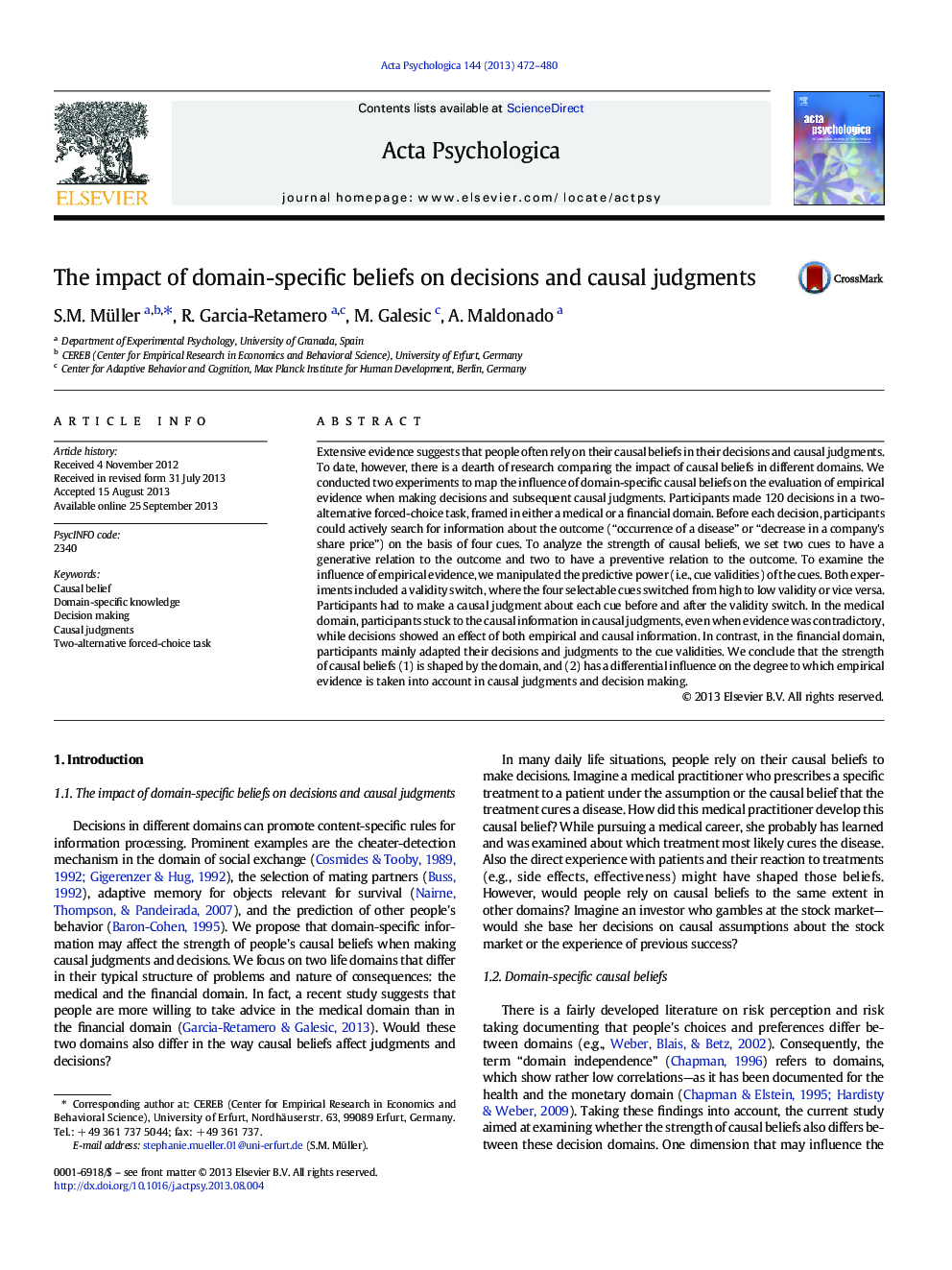| کد مقاله | کد نشریه | سال انتشار | مقاله انگلیسی | نسخه تمام متن |
|---|---|---|---|---|
| 10453797 | 920249 | 2013 | 9 صفحه PDF | دانلود رایگان |
عنوان انگلیسی مقاله ISI
The impact of domain-specific beliefs on decisions and causal judgments
ترجمه فارسی عنوان
تأثیر باورهای خاص دامنه بر تصمیمات و قضاوت های علیت
دانلود مقاله + سفارش ترجمه
دانلود مقاله ISI انگلیسی
رایگان برای ایرانیان
کلمات کلیدی
2340، باور عقلانی، دانش خاص دامنه، تصمیم سازی، قضاوت های عقلانی، دو گزینه کار اجباری مجاز،
ترجمه چکیده
شواهد گسترده نشان می دهد که مردم در تصمیمات و قضاوت های علیت بر باورهای علیت خود تکیه می کنند. با این حال تا به امروز کمبود تحقیقاتی در مورد تأثیر باورهای علی در حوزه های مختلف وجود دارد. ما دو آزمایش انجام دادیم تا تأثیر باورهای علیت خاص دامنه بر ارزیابی شواهد تجربی را در هنگام تصمیم گیری و قضاوت های عاملی بعدی بررسی کنیم. شرکت کنندگان 120 تصمیم را در یک کار انتخابی دو گزینه ای که در زمینه پزشکی یا مالی طراحی شده است، انجام دادند. قبل از هر تصمیم گیری، شرکت کنندگان می توانند به طور فعال اطلاعات مربوط به نتیجه (وقوع یک بیماری یا کاهش در قیمت سهام شرکت) بر اساس چهار نشانه جستجو کنند. برای تجزیه و تحلیل قدرت اعتقادات علی، ما دو نشانه را برای یک رابطه نسبی با نتیجه و دو را به رابطه پیشگیرانه با نتیجه می دهیم. برای بررسی تأثیر شواهد تجربی، ما قدرت پیش بینی (یعنی اعتبار نشانه) نشانه ها را دستکاری کردیم. هر دو آزمایش شامل یک سوئیچ معتبر بود، جایی که چهار نشانه قابل انتخاب از اعتبار بالا تا پایین و یا بالعکس تغییر یافتند. شرکت کنندگان مجبور بودند قضاوت علی را در مورد هر نشانه قبل و بعد از سوئیچ اعتبار ایجاد کنند. در حوزه پزشکی، شرکت کنندگان در قضاوت علی، اطلاعات علمی علیه قضیه را به وجود آوردند، حتی زمانی که شواهد متناقض بود، در حالی که تصمیمات نشان دهنده تاثیر اطلاعات تجربی و علمی بود. در مقابل، در حوزه مالی، شرکت کنندگان عمدتا تصمیمات و قضاوت های خود را به اعتبار نامه های نشانه پذیرفته بودند. ما نتیجه می گیریم که قدرت اعتقادات علی (1) به وسیله حوزه شکل می گیرد و (2) تأثیر دیفرانسیل را بر میزان معیار تجربی در تصمیم گیری های علیت و تصمیم گیری دارد.
موضوعات مرتبط
علوم زیستی و بیوفناوری
علم عصب شناسی
علوم اعصاب شناختی
چکیده انگلیسی
Extensive evidence suggests that people often rely on their causal beliefs in their decisions and causal judgments. To date, however, there is a dearth of research comparing the impact of causal beliefs in different domains. We conducted two experiments to map the influence of domain-specific causal beliefs on the evaluation of empirical evidence when making decisions and subsequent causal judgments. Participants made 120 decisions in a two-alternative forced-choice task, framed in either a medical or a financial domain. Before each decision, participants could actively search for information about the outcome (“occurrence of a disease” or “decrease in a company's share price”) on the basis of four cues. To analyze the strength of causal beliefs, we set two cues to have a generative relation to the outcome and two to have a preventive relation to the outcome. To examine the influence of empirical evidence, we manipulated the predictive power (i.e., cue validities) of the cues. Both experiments included a validity switch, where the four selectable cues switched from high to low validity or vice versa. Participants had to make a causal judgment about each cue before and after the validity switch. In the medical domain, participants stuck to the causal information in causal judgments, even when evidence was contradictory, while decisions showed an effect of both empirical and causal information. In contrast, in the financial domain, participants mainly adapted their decisions and judgments to the cue validities. We conclude that the strength of causal beliefs (1) is shaped by the domain, and (2) has a differential influence on the degree to which empirical evidence is taken into account in causal judgments and decision making.
ناشر
Database: Elsevier - ScienceDirect (ساینس دایرکت)
Journal: Acta Psychologica - Volume 144, Issue 3, November 2013, Pages 472-480
Journal: Acta Psychologica - Volume 144, Issue 3, November 2013, Pages 472-480
نویسندگان
S.M. Müller, R. Garcia-Retamero, M. Galesic, A. Maldonado,
